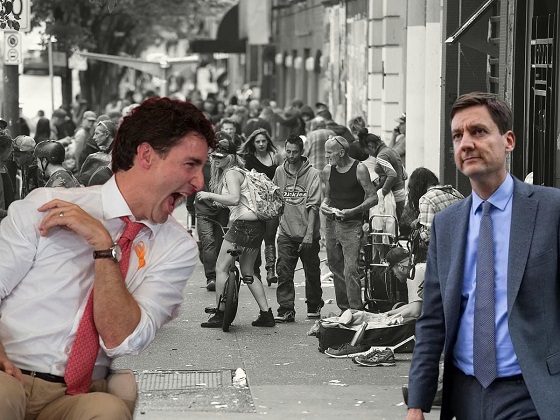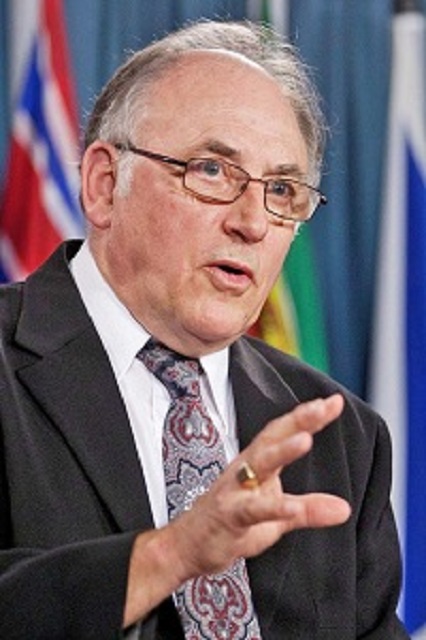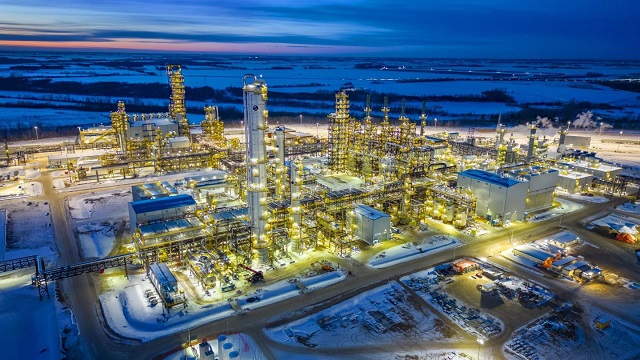Alberta
Notes from Flight 163, the oilsands shuttle from Toronto to Edmonton

Shared with permission from author Stewart Muir
Stewart Muir is a Victoria-based writer who serves as executive director of the Resource Works Society.
On a recent Monday morning, I found myself on Air Canada Flight 163 from Toronto Pearson to Edmonton. As the plane loaded, I began to sense there was something not so regular about the passengers boarding the Airbus 320 for a regularly scheduled flight.
Unlike those I more typically see on my flights, nobody was in flip-flops or golf wear, or fussing with oversized or unnecessary luggage. This was a mix mostly without the easy-to-spot snowbirds, students, and first-time fliers.
The travellers this day were mostly middle-aged men, fit-looking and dressed Mark’s Work Wearhouse casual. There were some women too, and like the men they moved with familiar ease through the cabin lugging full but neatly packed backpacks or duffels. Many carried a preferred travel distraction in hand, ready for a few hours of Netflix or sudoku. I could hear the distinctive accents of the Maritimes and Quebec, and the more familiar central Canadian English, as they found their places the way transit riders enter a subway car.
It was rapidly apparent that I was witnessing a commuter routine, one not meaningfully different than the suit-filled shuttles carrying day-tripping lawyers, accountants, pharma reps, engineers and lobbyists from the same airport that morning to destinations like Ottawa, Montreal, Boston and New York.
In concentrated form, I was witnessing a typical, daily migration of the Canadian oil sands workforce, probably with some LNG and mining thrown in. They were heading to the workplace. Not for a day, but for stretches of a week or two.
Multiply this by dozens or scores, in airports across the country, usually less starkly evident than on this particular flight, and it was just a regular day in Canadian air travel as the massive energy employee base changed shift.
A few hours later, after we unloaded at the other end, I headed for the exit and my Uber. Not so most of my fellow passengers. They continued on their way to connecting flights – to destinations such as Fort McMurray, Grande Prairie, and air services flying direct to some of the big oil sands projects – in time for shift change at the work camps where they were expected.
Statistics could not convey more forcefully than this how the oil & gas economy has a singular and powerful effect on the economy. The large paycheques drawing these men and women to their jobs in the West flowed directly back to their family bank accounts in the GTA and beyond, paying mortgages, grocery bills, taxes and hockey fees.
Flight 163, multiplied many times over, represents what the energy sector, at its most direct and tangible, does for the Canadian economy.
This is what I’m thinking about while surveying a nation that is now deep into an unprecedented social and economic crisis.
Over the coming days and weeks, things that we do will affect how deep and damaging this crisis becomes.
We are seeing Green New Deal advocates pursue the thesis that the coming economic catastrophe is the perfect moment to “transition off fossil fuels”. There are plenty of signs of this thought process – “Hey guess what guys, in one stroke we could meet the Paris Agreement by dropping emissions to 30 per cent below 2005 levels – not by 2030, but by 2021!”
To put this in perspective, consider that the Conference Board of Canada recently estimated that in one of the milder transition scenarios, meeting such targets will cost Canadians $2.2 trillion and require 14 per less use of residential energy, 47 per cent less car travel, eight times the subway use, and 54 per cent less domestic air travel.
Who’s ready to make this change overnight? We couldn’t do it if we wanted to. Think for just a moment about the costs and tradeoffs required, and the difficulty of accomplishing it in the midst of a global health crisis. Clearly it makes no sense at all. Yet Canada might be the only oil-exporting country where accelerating the transition is likely to receive serious acknowledgment in senior decision-making circles.
Even without such measures, Canada is already moving in the right direction: we are a global leader in clean energy, with 80 per cent of the population living in provinces where more than 90 per cent of electricity is drawn from non-fossil fuel sources. This alone makes us the envy of the world. The prevalence of clean electricity means that wherever it is used in industry, the resulting resource commodity exports can outcompete most other similar products in climate terms, with the bonus that they can allow importing countries to reduce their own emissions.
Mere inattention could do as much damage at this time as a wrong decision. Standing back and watching the domestic oil and gas industry topple will have an effect on citizen wellbeing far in excess of what the collapse of any other industry would bring.
We would be looking at the long-term impairment of Canadian living standards – that is to say a reduction in the value of our jobs, in our quality of life, in our educational opportunities, and in our ability to help other countries while continuing as a net positive influence on the world.
The fossil fuel industry – “it is how we earn our living”
It’s hard to describe how important the energy industry is to Canada. Let me try.
Andy Calitz, the former CEO of LNG Canada who performed the herculean task of achieving a positive final investment decision (FID) for the project before moving on to his next challenge, provided a memorable image when he spoke at a small dinner of diplomats and academics I attended not long after the FID.
When the first shipload of liquefied natural gas departs from Kitimat in a few years’ time, he said, that cargo would be worth $100 million – a staggering sum. (I’ve run this figure past a couple of experienced heads in the energy field, and nobody has scoffed at it.)
In Vancouver, we go giddy each spring at the thought of cruise ship season, which last year saw 290 sailings out of the port. If, as is commonly said, one of those sailings means $1 million injected into the local economy, how does that compare with LNG?
Back of envelope math says that a single year of LNG Canada operations, with its promised traffic of one ship in and one ship out every day, will have the impact of one century of the Vancouver cruise industry. I’m not knocking the cruise industry, it’s important and we need it. But let that comparison sink in.
Here’s another one.
Back in 2017, I calculated that natural gas investments in British Columbia that year were on a scale that equated to building the behemoth Wynn hotel in Las Vegas (4,750 rooms over 215 acres) in the Vancouver area, along with a special SkyTrain extension to serve it. ( Natural gas is back: British Columbia drilling surge is behind $5+ billion in 2017 investment )
Never mind that no investor has ever come forward with such a bold plan for a new resort anywhere in Canada. And it’s actually pretty fortunate that we got the energy infrastructure rather than the casino, given the prospects for tourism in 2020.
Economist Patricia Mohr recently pointed out that Canada is “a trading nation and an ‘energy specialist’ — it is how we earn our living.” Crude oil, all by itself, generated net exports of $62 billion in 2019, up from $57.5 billion in 2018 — far above any other export category.
As Ms. Mohr stated, oil exports come in handy given that we habitually run large deficits in other areas including motor vehicles and parts, machinery, electronic equipment, and consumer goods.
During the COVID-19 crisis, it’s obvious we cannot go without lifesaving medical necessities. Unlike our abundant oil, producing them isn’t a great strength. Canada must import billions’ worth of these goods every year. If you isolate just three medical categories – vaccines, medical apparatus and breathing aids – the numbers show clearly that our own ability to manufacture these items is very limited, even as consumption grows year after year.

The current global crisis has already brought a plummeting Canadian dollar, which in turn makes the imported goods that we rely on more costly. Exports that we can sell for U.S. dollars will offset this, but only if we have products to sell and markets ready to buy them. We need to preserve the ability to produce more as more income is needed, while at the same time figuring in the unfortunate reality that many of the things we export are themselves falling in price, so that higher production volumes are required just to stay in place.
The resource economy actually turns out – despite its detractors – to be both flexible and durable as a source of national well-being. Markets for some of the commodities we produce can be expanded at will, something that cannot be said of iPhones, beach umbrellas or BMWs.
Right now in Russia, the government is starting to realize it might not have been such a good idea to enter into an oil price war with Saudi Arabia. More and more evidence suggests that for a winner to emerge will require not months but years of effort, and at the end of it the United States oil industry, resented deeply by both Russia and Saudi Arabia, could well come on top anyways.
The most chilling observation, as reported today by the Wall Street Journal, comes from Igor Sechin, head of Russia’s largest oil producer, state-controlled giant Rosneft: “If you give up your market share, you will never get it back.”
There’s a lesson in this for Canada. Those who see an “opportunity” to deliberately give up our oil market share, to encourage a fast pivot into an unknown energy future, are playing recklessly with how we as a country earn our living. If we ratchet down production by letting industry fail, and decide later that it was a mistake to do so, we will not easily be able to retrieve our market share. That’s a frightening thought. Worse still, killing off the industry will make Canadians more dependent on imported oil, which will have to be paid for using a weakened loonie.
Doing what’s necessary
In 2018, the federal government announced an export diversification strategy that would increase Canada’s overseas exports by 50 per cent by 2025. Even before the combined oil/pandemic crisis, it seemed an unlikely ambition.
“Investing in infrastructure to support trade” was one of the ways Ottawa deemed it could aid this ambitious goal, and credit is due for supporting projects such as the so-far-incomplete Trans Mountain and Coastal GasLink pipelines.
Other forces are holding us back. The Canada Infrastructure Bank, for example, is forbidden from investing its $35 billion of capital in fossil fuel projects, even if those investments could lead to lower energy use and emissions in the oil & gas upstream.
Meanwhile, our national infrastructure minister seems physically incapable of uttering the phrase “energy infrastructure” let alone the p-word (pipelines). Even our minister of natural resources has been placed in the uncomfortable position of carrying out a mandate letter requiring him to making finding alternative employment for oil and gas workers and communities a central task.
Now is the time to save, not strangle, an oil and gas industry that is frantically signalling the need for intervention .
Prime Minister Justin Trudeau’s Quebec lieutenant Pablo Rodriguez yesterday promised Bombardier : “Our government is taking the necessary steps to get you financial help as quickly as possible.” A stock analyst opined that the Canadian and Quebec governments were “likely to offer support if Bombardier gets close to the edge.” (See Globe and Mail story .)
If a single company controlled by a wealthy clan, making luxury jets for billionaires, is to be given this treatment, then there should be no hesitation all in backing the industry that convincingly represents the foundational strength of our entire nation.
Trudeau has always found it difficult to make strong gestures of support to the Canadian oil patch. This time, finding it within himself to say those words of support matters more than ever. There is a very serious risk that Canada’s long term prosperity in both an absolute and a relative sense will be impaired by what occurs in the coming hours, days and weeks. Ahead of us, economic success will only come through determination and political commitment to put people and jobs first.
Stewart Muir is a Victoria-based writer who serves as executive director of the Resource Works Society.
Grow your business with the Daily Oil Bulletin – the trusted source for Canada’s oilpatch.
Canada in talks with the U.S. to avoid troops at the border, says Trudeau
Alberta Energy Regulator names senior Saskatchewan government official as CEO
Alberta
Political parties will be part of municipal elections in Edmonton and Calgary pilot projects

Strengthening Alberta’s local elections
Alberta’s government is introducing legislation to ensure Albertans can rely on transparent, free and fair elections, and municipally-elected officials have clearer accountability measures.
In a democratic society, Albertans expect their local elections to be free and fair, and their elected officials to be held to account by clear rules that govern their local councils. The Municipal Affairs Statutes Amendment Act proposes amendments to the Local Authorities Election Act (LAEA) and the Municipal Government Act (MGA) to add greater transparency to local election processes and ensure local councils and elected officials continue to remain accountable to the citizens who elected them.
“Our government is committed to strengthening Albertans’ trust in their local governments and the democratic process that elects local leaders. The changes we are making increase transparency for Alberta voters and provide surety their votes will be counted accurately. We know how important local democracy is to Albertans, and we will work with local authorities to protect and enhance the integrity of local elections.”
Local Authorities Election Act
Albertans expect free and fair elections and that’s why it’s important we strengthen the rules that govern local elections. To strengthen public trust in local elections, Alberta’s government will eliminate the use of electronic tabulators and other automated voting machines. All Albertans should be able to trust the methods and results of local elections; requiring all ballots to be counted by hand, clarifying rules and streamlining processes for scrutineers will provide voters greater assurance in the integrity of the results.
All eligible Albertans should be able to vote in local elections without impediment. Alberta’s government will limit the barriers for eligible voters to cast a ballot by expanding the use of special ballots. Currently, special ballots can only be requested for very specific reasons, including physical disability, absence from the municipality, or for municipal election workers. By expanding the use of special ballots, the government is encouraging more voter participation.
Amendments in the Municipal Affairs Statutes Amendment Act would increase transparency in local elections by enabling political parties at the local level. Political parties would be enabled in a pilot project for Edmonton and Calgary. The act will not require candidates to join a political party in order to run for a local or municipal office, but will create the opportunity to do so.
In addition, proposed changes to the Local Authorities Election Act would allow municipalities the option to require criminal record checks for local candidates, thus increasing transparency and trust in candidates who may go on to become elected officials.
Municipal Government Act
The role of an elected official is one with tremendous responsibility and expectations. Changes proposed to the Municipal Government Act (MGA) will strengthen the accountability of locally elected officials and councils. These include requiring mandatory orientation training for councillors, allowing elected officials to recuse themselves for real or perceived conflicts of interest without third-party review and requiring a councillor’s seat to become vacant upon disqualification.
If passed, the Municipal Affairs Statutes Amendment Act will also unlock new tools to build affordable and attainable housing across Alberta. Proposed amendments under the MGA would also create more options for municipalities to accelerate housing developments in their communities. Options include:
- Exempting non-profit, subsidized affordable housing from both municipal and education property taxes;
- Requiring municipalities to offer digital participation for public hearings about planning and development, and restricting municipalities from holding extra public hearings that are not already required by legislation; and
- Enabling municipalities to offer multi-year residential property tax exemptions.
Municipal Affairs will engage municipalities and other partners over the coming months to hear perspectives and gather feedback to help develop regulations.
Quick facts
- The LAEA establishes the framework for the conduct of elections in Alberta municipalities, school divisions, irrigation districts and Metis Settlements.
- The MGA establishes the rules governing the conduct of local elected officials once on council, as well as the overall administration and operation of municipal authorities in Alberta, including any policy those authorities may wish to implement.
Related information
Alberta
Alberta official reveals ‘almost all’ wildfires in province this year have been started by humans

From LifeSiteNews
Alberta Minister of Forestry and Parks Todd Loewen said his department estimates that most of the province’s wildfires this year are man-made and not caused by ‘climate change.’
Alberta officials have announced that almost all fires in 2024 are believed to have been caused by humans despite ongoing claims that “climate change” is to blame.
On April 24, Alberta Minister of Forestry and Parks Todd Loewen revealed that his department estimates that most of the province’s wildfires this year are man-made and not caused by “climate change” as claimed by mainstream media and politicians.
“We expect that almost all of the wildfires we’ve experienced so far this year are human caused, given the point we’re at in the season and the types of weather we’re seeing,” Loewen stated.
Already, Alberta has put out 172 wildfires this year, and 63 are actively burning. However, Loewen did not seem overly alarmed, instead warning Albertans to watch their local fire bans and restrictions to reduce the high number of man-made wildfires.
“I urge you to assess your property for wildfire danger and take any preventive action you can to address these risks,” he said.
“This includes breaking up fuel sources that could ignite a structure, removing trees in close proximity to your home, and properly maintaining your gutters and roofs to rid the materials that could easily ignite such as leaves and dry needles,” Loewen added.
Loewen’s announcement comes just weeks after Alberta Premier Danielle Smith promised that arsonists who ignite wildfires in Alberta will be held accountable for their crimes.
“As we approach the wildfire season, it is important to understand that 67% of wildfires in Alberta are started by people,” she explained.
“If you start a wildfire, you can be charged, fined, and held liable for all costs associated with fighting the wildfire,” Smith added.
Smith made the comments after last year revealing that most of the wildfires in her province (500 of the 650) were caused by humans and not “climate change,” as has been pushed by the legacy media and opposition politicians.
“All I know is in my province we have 650 fires and 500 of them were human caused,” she said, “so we have to make sure that when people know that when it’s dry out there and we get into forest fire season that they’re being a lot more careful because anytime you end up with an ignition that happens it can have devastating consequences.”
The Alberta government has also created an ad campaign highlighting the fact that most fires are caused by humans and not “climate change,” as many left-leaning politicians claim.
As reported by LifeSiteNews last year, Smith ordered arson investigators to look into why some of the wildfires that raged across the vast expanse of the province had “no known cause” shortly after they spread.
Indeed, despite claims that wildfires have drastically increased due to “climate change,” 2023 research revealed that wildfires have decreased globally while media coverage has spiked 400 percent.
Furthermore, many of the fires last spring and summer were discovered to be caused by arsonists and not “climate change.”
Royal Canadian Mounted Police (RCMP) have arrested arsonists who have been charged with lighting fires across the country, including in the Yukon, British Columbia, and Alberta.
In Quebec, satellite footage also showed the mysterious simultaneous eruption of several blazes across the province, sparking concerns that the fires were a coordinated effort by arsonists.
Despite the overwhelming evidence, Prime Minister Justin Trudeau and mainstream media continue to claim that the fires are unprecedentedly dangerous and caused by “climate change” in an attempt to pass further regulations on natural resources.
The reduction and eventual elimination of the use of so-called “fossil fuels” and a transition to unreliable “green” energy has also been pushed by the World Economic Forum (WEF) – the globalist group behind the socialist “Great Reset” agenda – an organization with which Trudeau and some in his cabinet are involved.
-

 Alberta1 day ago
Alberta1 day agoRed Deer Doctor critical of Alberta’s COVID response to submit report to Danielle Smith this May
-

 conflict1 day ago
conflict1 day agoCol. Douglas Macgregor torches Trump over support for bill funding wars in Ukraine and Israel
-

 Business8 hours ago
Business8 hours agoDon’t be fooled by high-speed rail
-

 COVID-192 days ago
COVID-192 days agoInquiry shows Canadian gov’t agencies have spent $10 million on social media ads for COVID jabs
-

 Alberta7 hours ago
Alberta7 hours agoActivity-Based Hospital Funding in Alberta: Insights from Quebec and Australia
-

 Business2 days ago
Business2 days agoFederal government’s ‘fudget budget’ relies on fanciful assumptions of productivity growth
-

 Health1 day ago
Health1 day agoTransgender activists are threatening the author of scathing UK report on child ‘sex changes’
-

 Business6 hours ago
Business6 hours agoUN plastics plans are unscientific and unrealistic








